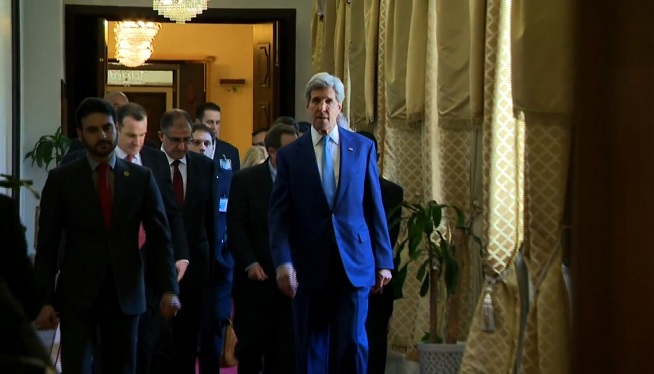BAGHDAD — (CNN) U.S. Secretary of State John Kerry arrived for an unannounced visit to Baghdad on Friday, as the country’s political crisis threatens the fight against ISIS.
The top U.S. diplomat’s visit, which was not made public until Kerry arrived, is part of an effort to shore up an embattled Prime Minister fighting to stay in office. Kerry will meet with Prime Minister Haider al-Abadi, Foreign Minister Ibrahim al-Jaafari and Council of Representatives Speaker Saleem al-Jabouri.
Kerry’s visit kicked off with a news conference, where he announced the U.S. is providing nearly $155 million in additional humanitarian assistance, totaling more than $778 million in assistance since 2013.
“The United States is determined together with Iraq and the coalition that we will succeed,” Kerry said at the event. “Together we will help the people of this country recover and go forward.”
State Department spokesman John Kirby said Kerry will underscore the strong U.S. support for the Iraqi government as it addresses significant security, economic and political challenges, including the fight against ISIS militants that has ravaged the country.
Kerry will also meet with the leadership of the Kurdistan Regional Government “to express U.S. appreciation for the critical role that the Kurdistan Regional Government has played in the coalition’s efforts to defeat Da’esh,” Kirby said, using another name for ISIS.
Abadi has faced protests and calls for his removal, including by his predecessor Nuri al-Maliki, as he pushes a Cabinet reshuffle aimed at combating corruption and mismanagement.
Despite holding some of the world’s largest oil reserves, Iraq is grappling with an economic crisis, high unemployment and poor public services, all furthering long-standing resentments against a ruling class blamed for squandering budget surpluses when oil prices were high.
The Prime Minister proposed a package of sweeping reforms last summer to combat corruption and government spending, but sectarian tensions and the country’s struggle against ISIS militants have slowed the reform process.
Abadi’s fiercest challenge comes from firebrand Shiite cleric Muqtada al-Sadr, whose supporters demanded he announce a new government and plans for reform by the end of the month.
Sadr, once a fierce opponent of U.S. coalition forces in Iraq, is now focusing on domestic political reforms. He has called for a government made up of technocrats, rather than political cronies, and for corrupt politicians to be held accountable.
Sadr called off the protests late last week when Abadi trimmed the size of his Cabinet and submitted a new list of nonpolitical ministers for approval by parliament, keeping only two. Sadr has promised to press for a no- confidence vote.
Kerry discussed Iraq’s political crisis Thursday during talks in Bahrain with ministers from the six-nation Gulf Cooperation Council.
Emphasizing the importance of Iraq’s struggle against ISIS, Kerry said the ministers agreed on “the need to support the Abadi government in its efforts to stabilize and eventually rebuild the country.”
Kerry’s visit is part of intensive U.S. engagement to support Abadi. Last week, Brett McGurk, the U.S. envoy to the anti-ISIS coalition discussed the political crisis with Kurdish regional President Massoud Barzani on Sunday before visiting Baghdad for talks with more officials.
U.S. Vice President Joe Biden called Abadi to offer U.S. support in his political reform efforts. The White House said Biden also underscored the critical importance of sustaining “momentum” in fighting ISIS militants.
Washington is concerned the political gridlock could jeopardize that fight, especially after fears of more violence prompted Abadi to pull some of Iraq’s counter-terrorism forces from the fight against ISIS in western Anbar province to help secure the capital.
The Iraqi army has won a string of victories against ISIS in recent months and has retaken an estimated 40% of territory the militants held last year. But it still controls large swaths of territory, including Mosul, the country’s second-largest city.
A senior State Department official said Kerry will “encourage the Iraqis while they’re dealing with the Cabinet reshuffle not to lose sight of the need to stay focused on the fight against ISIL,” not only to preserve recent gains in Anbar province, but “not to lose sight” of the upcoming campaign to retake Mosul.
But the official praised Abadi’s emphasis on reform and decentralizing authority from Baghdad, which is needed to boost Iraq’s sagging economy and improve the delivery of services.
“To be able to address that requirement for reform and to be responsive to the Iraqi people, he’s taken on this challenge of reshuffling his Cabinet,” the official said. “Although it extends the possibility of at times distracting and maybe shifting focus away from the battlefield, it’s something that has to be done nonetheless.”
The-CNN-Wire ™ & © 2016 Cable News Network, Inc., a Time Warner Company. All rights reserved. (Photo: CNN)





















